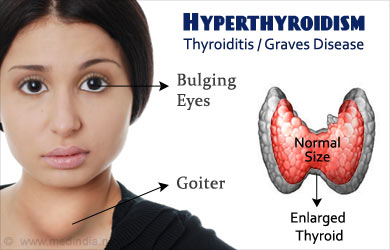Hyperthyroidism
Hyperthyroidism is a condition whereby the thyroid gland becomes hyperactive by releasing more thyroid hormones than the body normally requires for metabolism. The  thyroid hormones that are excessively released are the T3 and T4 hormones.
thyroid hormones that are excessively released are the T3 and T4 hormones.
The thyroid gland, a butterfly-shaped gland situated just below Adam’s apple is responsible for the release of T3 and T4 hormones that regulate metabolism in the body system. The pituitary gland controls the thyroid gland through the release of Thyroid Stimulating Hormone TSH through a feedback mechanism to maintain a balance.
Causes of Hyperthyroidism
Hyperthyroidism happens either when the thyroid gland produces too many hormones or when the pituitary gland is unable to keep the balance needed. This occurs in some condition such as grave disease, thyroiditis, thyroid noodles, increased intake of iodine, tumors and side effect of drug intake for the treatment of hypothyroidism.
Diagnostic of Hyperthyroidism
With the aid of blood test, thyroid stimulating hormone TSH level can be measured. A low amount of TSH and a high level of T3 and T4 hormones are used in the proper diagnosis of Hyperthyroidism. To diagnose a nodular form of Hyperthyroidism, USG of the thyroid is also determined.
Symptoms of Hyperthyroidism
The main symptoms of Hyperthyroidism shown includes the following
- Nervousness – this condition makes patients unnecessarily nervous at the slightest trigger. Some patients also show restlessness and mental irritability.
- Tachycardia, palpitations or irregular heartbeat – patients might experience increased heart rate as high as 100 beats per minute. Other patients can experience palpitations or irregular heartbeat.
- Fatigue– the patient feels tired and quickly exhausted most times. The feeling may seem like a muscle weakness around the thigh and upper arm.
- Trembling of the hands – this is familiar with most patients as they find it hard to keep their hands from shaking.
Other symptoms include sleep disturbance, increased nail growth, hair loss and other hair changes, increased bowel movements, menstrual disorders, weight loss, sweating, changes of the eyebrow and exophthalmos (protrusion of the eyeballs).
Homeopathy for Hyperthyroidism treatment
Homeopathy remains one of the best treatments available for Hyperthyroidism with many available remedies for treatment. With no side effects and completely safe, homeopathic remedies provide total healing from Hyperthyroidism when used for the specified required time for using such a solution. For proper prescription of homeopathic remedies, all symptoms peculiar to the patient is taken into account, and this makes each prescription to be unique on its own. Prescription requires a high level of expertise and experience on the part of the homeopath to prescribe the suitable remedies needed for a particular patient.
For Hyperthyroidism showing symptom of diarrhea
Medicines such as Aloe, Sulphur, and phosphorus are useful for the treatment of symptoms shown in the form of diarrhea in hyperthyroid patients
For Hyperthyroidism showing symptom of palpitations and fast heart rate
Palpitation and increased heart rate can be controlled using Lycopus Virginicus and lodium.
For Hyperthyroidism showing symptom of loss of weight
Iodium is best used to achieve quick weight gain as a result of weight loss caused by Hyperthyroidism. Though the patient has his or her appetite intact, loss of weight is noticeable.
Other common remedies and the characteristic symptoms they are used in treating include Natrum Muriaticum for irritability, Lachesis Mutus for extreme heat, phosphorus for extreme sensitivity, hair fall, feeling hungry after eating, Conium Maculatum for depression and Pulsatilla Pratensis for menstrual troubles in women.
Acupuncture Treatment for Hyperthyroidism
Acupuncture looks out for how to improve the constitutional factor of the patient primarily looking at the liver to deal with stress which is believed to be the cause of the imbalance. Acupuncture believes that the liver can be responsible for imbalance when it is blocked and not allowing the free flow of energy to the meridians. This leads to the accumulation of phlegm and fluid that blocks the throat area causing goiter.
The associated symptoms such as sweating, heat intolerance and palpitations are caused by hot liver and also triggered by spicy food. Acupuncture is used together with Chinese herbs to achieve successful treatment of Hyperthyroidism. Herbs such as Huang Qi (Radix Astragali Membranacei) at high dose is used to lower T3 and T4 hormones produced in the body to achieve the right balance.
Hyperthyroidism treatment in Philadelphia PA
Viva Healthy Life – The Holistic Center in the Northeast of Philly housing all holistic treatments and diagnostics under one roof. Doctor Tsan and associates are licensed in acupuncture and homeopathy and use these techniques successfully.
To book an appointment for Alternative Holistic Evaluation call our center or use our online scheduling system
You must be logged in to post a comment.